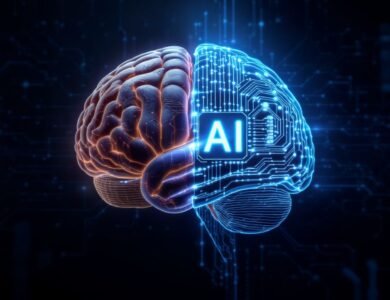
Artificial intelligence (AI) is changing the business world. The global AI market is expected to grow fast, at a 38.1% annual rate from 2022 to 2030. This growth is reshaping industries and how companies work, paving the way for the future ai landscape.
As AI gets better, more businesses are using it to stay ahead. A big 77% of companies are either using AI or looking into it. This shows how important it is to know how AI affects business.
AI is not just a tool; it’s a game-changer for businesses worldwide.
Key Takeaways
- AI is transforming industries and revolutionizing business operations.
- The global AI market is projected to grow at a CAGR of 38.1% from 2022 to 2030.
- A significant 77% of companies are using or exploring AI in their businesses.
- AI adoption is becoming a key factor in business success.
- Understanding AI’s impact is key for businesses to stay competitive.
The Current State of AI in Business
The business world is changing fast with AI. Companies using AI see big changes in how they work, make decisions, and talk to customers. AI could make work more productive by 1.5 percentage points in the next ten years.
About 56% of businesses use AI to make their operations better. This shows how much AI is helping companies stay ahead.
Key AI Technologies Driving Business Change
Machine learning and deep learning applications help automate tasks and improve predictions. These tools help businesses make smart choices and work more efficiently.
Machine Learning and Deep Learning Applications
Machine learning finds patterns in big data, helping businesses predict trends. Deep learning takes it further by handling complex data.
As we look ahead, understanding the future ai impact on business strategies will be crucial for success.
Natural Language Processing Breakthroughs
Natural Language Processing (NLP) has made big strides. It lets businesses talk to customers better through chatbots and voice assistants. NLP makes customer service more personal and quick.
The Future of Business: The Impact of Artificial Intelligence
The future of business will see a big change with artificial intelligence. AI will bring new chances and challenges. Businesses must keep up with AI’s growth to stay ahead.
Transformative AI Technologies
AI is set to change business transformation with AI for the better. It will make operations more efficient and help in making better decisions. In the near future, AI will have a big effect on how businesses work.
Short-term Business Impacts (2023-2025)
In the next few years, AI will boost productivity and efficiency in many fields. For example, AI in construction could make things 50% more efficient by analyzing data in real-time.
Long-term Industry Disruptions
Looking further ahead, AI will shake up the business world, changing industries and creating new models. For instance, AI could add over $1 billion to the banking industry’s value by 2035, changing finance forever.
| Industry | Short-term Impact | Long-term Impact |
|---|---|---|
| Banking | Improved Risk Management | $1 Billion+ Value Addition by 2035 |
| Construction | 50% Productivity Increase | Enhanced Project Management |
As we move forward, it’s key for businesses to adopt artificial intelligence business solutions. Knowing AI’s effects will help companies get ready for the future.
How AI is Reshaping Traditional Business Models
AI is changing how businesses work and add value. It’s not just a trend; it’s a big change. It’s altering how companies operate, compete, and serve their customers.
From Product-Centric to Service-Oriented Approaches
AI is helping companies move from focusing on products to services. With AI, businesses can offer personalized services and experiences. This creates new ways to make money and makes customers happier.
This change comes from AI’s ability to analyze vast amounts of data. It gives insights that help tailor services to what customers need.
Subscription and On-Demand Economy Growth
The growth of the subscription and on-demand economy shows AI’s big impact. AI-driven platforms are making it easier for people to get what they need when they need it. This shift is because AI can predict what customers want and make offers that fit their needs.
AI Applications Transforming Customer Experience
AI is changing how businesses talk to customers, making interactions more personal and quick. It does this by handling lots of data, helping businesses offer personalization at scale.
Personalization at Scale
AI lets companies understand what customers like and do. This way, they can give services that really meet their needs. It makes customers happier, more loyal, and keeps them coming back.
Conversational AI and Customer Service Evolution
Conversational AI is making customer service better. It includes chatbots and virtual assistants that answer many questions. Also, voice-based customer interactions are getting more popular, making it easier for customers to talk to businesses.
Chatbots and Virtual Assistants
Chatbots and virtual assistants are changing customer service. They offer help anytime, day or night, and solve simple problems. This makes answers faster and helps human agents focus on harder tasks.
Voice-Based Customer Interactions
Voice-based interactions are changing how we talk to businesses. Customers can use voice commands to get info, buy things, or control smart devices. It makes talking to businesses easier and more convenient.
The Evolution of Decision-Making with AI
AI has changed how businesses make decisions. Now, they can use data to make choices faster and more accurately. This new way of thinking is changing how companies plan and work.
Data-Driven Strategic Planning
AI analytics give leaders real-time insights. This helps them make smart, data-backed decisions. Companies can quickly adapt to market shifts and customer wants.
Predictive Analytics in Business Operations
Predictive analytics is a big part of AI’s role in business. It helps predict future trends and challenges. By using past data and AI, businesses can run better and make better choices.
Real-time Decision Support Systems
Real-time decision support systems give executives the data they need fast. They combine data from many sources. This gives a full view of the business world.
AI-Augmented Executive Decision-Making
AI helps executives make better decisions. It uses AI insights to support their choices. This makes decision-making more data-driven.
Key Benefits of AI in Decision-Making:
| Benefit | Description | Impact |
|---|---|---|
| Enhanced Precision | AI analytics provide accurate insights | Better strategic decisions |
| Real-time Insights | Timely data for swift action | Improved operational efficiency |
| Predictive Capabilities | Anticipating future trends | Proactive business strategies |
Industry-Specific AI Transformations
AI technology is getting better, leading to more specific uses in different fields. It’s changing sectors like finance, healthcare, and retail in big ways. This change brings new ideas and makes things more efficient.
Financial Services and Banking
In finance, AI helps with fraud detection and personalized investment options. It looks through lots of data to spot fraud, cutting down on risks. Also, AI gives investment advice that fits your financial plans and how much risk you’re okay with.
Healthcare and Pharmaceutical Innovations
AI is changing healthcare, helping with patient care and pharmaceutical development. It makes diagnosing diseases faster and more accurate. It’s also used to create new medicines and treatment plans that fit each person.
Retail and E-commerce Evolutions
In retail and online shopping, AI makes the customer experience better and helps businesses grow. AI chatbots offer help any time, and AI analytics help understand what customers want. This leads to more personalized shopping and happier customers.
These AI changes are making things run smoother and opening up new chances for businesses. As AI keeps getting better, it will have an even bigger impact on many industries. This will lead to even more new ideas and changes.
AI’s Role in Supply Chain and Operations Optimization
AI is changing how businesses run their operations and supply chains. It helps companies work better, save money, and get more done. This makes them more efficient and productive.
Intelligent Automation in Manufacturing
Intelligent automation is making manufacturing better by making production smoother and products higher quality. AI automation tools help with tasks like processing invoices and planning social media. This frees up people to do more important work.
Predictive Maintenance and Inventory Management
Predictive maintenance uses AI to guess when equipment might break down. This cuts down on downtime and makes equipment work better. AI also helps manage inventory by looking at past data and current market trends. This keeps stock levels right, reducing waste and making supply chains more efficient.
Using AI in these ways can lead to big improvements in how businesses manage their supply chains and operations. This makes them more competitive in their markets.
The Changing Nature of Work in the AI Era
AI is changing work in big ways. It brings both challenges and chances for growth.
Jobs Being Transformed by AI
AI is making jobs different by automating simple tasks. It also helps humans do better work by working together.
Automation of Routine Tasks
Simple tasks are now automated. This frees people to do more creative and strategic work. It makes many industries more productive and efficient.
Human-AI Collaboration Models
Working with AI is becoming common. It lets people focus on tasks that need creativity and problem-solving skills. This teamwork is expected to lead to new ideas and growth.
New Roles and Skills Emerging
AI’s growth is creating new jobs and skills. People need to learn about AI literacy and how to work with AI.
AI Literacy Requirements
Knowing how AI works is key for workers in many fields. AI literacy helps in working well with AI.
Reskilling and Workforce Development
To keep up with job changes, we need to invest in training. This includes learning about new tech and soft skills.
Ethical Considerations and Responsible AI Implementation
AI is being used in many areas, raising big ethical questions. As companies use AI more, it’s key to make sure it’s used right. This means making sure AI is used in a way that’s fair and ethical.
Addressing Bias and Fairness Concerns
One big issue with AI is making sure it’s fair. To make AI fair, we need a diverse dataset. We also need to keep an eye on it and have humans check it. This helps avoid AI making unfair decisions.
Transparency and Explainability Challenges
Another big problem is making AI clear and easy to understand. As AI gets more complex, it’s hard to see how it makes decisions. Using clear AI designs and making models easy to understand can help.
By focusing on ethics and using AI responsibly, companies can avoid risks. They also build trust with their customers and others. This means working hard to fix bias, be clear, and explain AI decisions.
Competitive Advantages of AI-First Companies
AI is changing how businesses work, giving a big edge to those who start early. Companies using AI see big boosts in how well they work, how happy customers are, and how much money they make.
Case Studies of Successful AI Implementations
Many businesses have made AI a part of their daily work. For example, Amazon and Netflix use AI to make things more personal for customers. This makes customers stick around longer and feel more connected. AI-driven personalization is a big reason why some companies stand out.
Measuring ROI from AI Investments
Companies need to check how well AI is doing for them. They look at things like how much money they save, how much they make, and how happy customers are. This helps them make their AI plans better and get more ROI from AI investments.
Using AI gives companies a competitive advantage in their markets. As AI keeps getting better, businesses that invest in it will be ready for new challenges and what customers want.
Navigating the AI-Powered Business Landscape of Tomorrow
The future of business will be shaped by AI. It’s key for companies to stay ahead and navigate this AI-powered landscape well. As AI evolves, businesses must adapt to stay competitive.
Understanding AI’s impact on business is essential. It affects operations, customer experience, and decision-making. By using AI, businesses can find new opportunities, drive innovation, and grow sustainably.
To succeed, companies need to invest in AI research and development. They should also foster a culture of innovation. By doing this, they can lead in the future of business and benefit from an AI-driven economy.



